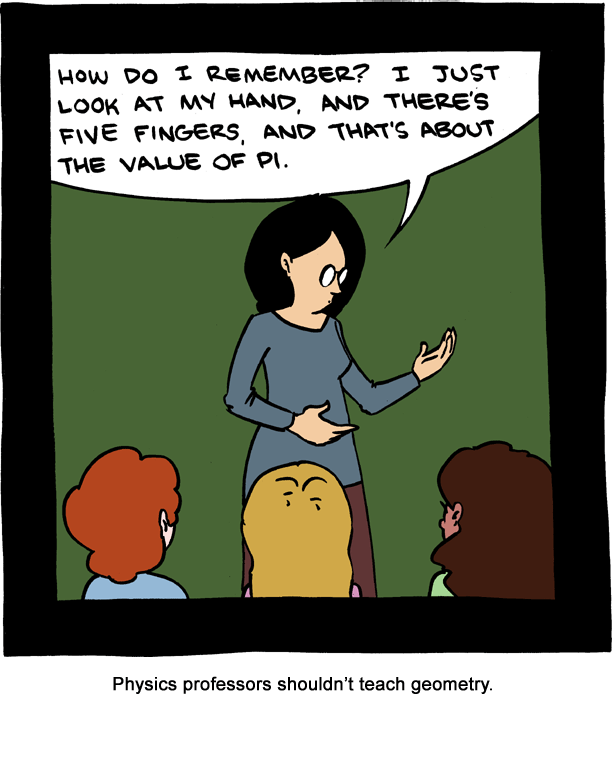- cross-posted to:
- lemmyshitpost@lemmy.world
- cross-posted to:
- lemmyshitpost@lemmy.world
cross-posted from: https://lemm.ee/post/29980757
Let π = 5
There are people that think this post is wrong because the equation is wrong or due to a lack of units
The equation for cylindrical volume is correct (circular area multipled by height).
And the units are unimportant (can be described as cubed units)
The issue is that Pi is a constant. Constants and variables are different things.
Other examples of constants: 1, 24, 7, -1 … Etc.
Saying Pi = 5 is like saying 1 = 5 … Both Pi and numbers like 1,2,3, etc. have a constant (non-varying) value.
You can’t reassign a value on a constant. It’s like me sticking up 3 fingers and claiming there are 5 fingers there.
For the purpose of teaching young school kids how to substitute real values for constants/variables, does it matter? π is a constant, but the value you use for it in exams and real life will not be the same, or the actual correct value. Getting students used to the idea that even constants can have varying values in exams or software is useful.
In my exams π had values ranging from 3, 3.1 to whatever the calculator had.
galso ranged from 9.8 to 10, although in fairnessgis not a constant.At least setting it to 5 can spark debate around what a more reasonable approximation should be.
OP’s problem isn’t even wrong.
It’s just assuming that π is 5 in this specific scenario, just like it’s reasonable to assume the existence of a spherical cow in a frictionless environment. Yeah, if you use the results of this problem to develop a real cylinder you’re going to have a bad time but nobody is doing that all what’s the problem?
Nobody is saying that from this point in time and going forward π = 5 and now math is broken forever. People need to chill
If it’s teaching grade school kids, I would argue it is problematic, only as to not draw confusion on reassigning π away from it’s widely accepted consistent value of ~3.14 for most applications. Once you start getting into theoretical physics and the like, that’s a different story. Math is already a tough subject for many kids and this would just throw another wrench into the learning curve. I’d argue to only start debating the fundamentals and theory after a firm grasp of the fundamentals has been established and practiced repeatedly, preferably in upper level courses.
I dont quite know what grade school is, but if you mean 12-15yo students, i dont think its that much more confusing:
πis likex, except that it is usually ~3.14. Sometimes exams or tests will give you a different value.I liked math though, so perhaps I am just biased there.
More or less that age, yeah. I’m guessing you’re outside the US, typically grade school here refers to Kindergarten to 12th grade (basically 5y to 17/18).
Perhaps this is an American methodology, but we were always taught that π is intended to represent the constant of 3.14 as it applies to circles in geometry and trigonometry, while various variables of x/y/z/etc were values to either be input or solved for. It wasn’t until Calculus that it was suggest that π could be variable dependent on other factors in a certain context, but that was usually pretty rare.
And yeah I enjoy math as well, but I also helped tutor my peers who didn’t grasp it, so I can understand why it was taught that way (that and our education system is interesting, for lack of a better term).
Yup, Australian, and thats primary+secondary school here. Im only harping on the test/exam thing because i vaguely recall having some tests were π was set to a specific value like 3.1, and that if you used the calculator π, all your answers ended slightly off. It wasnt anything to do with π being a variable, just the you had better read the exam question carefully and that blindly typing the equation into the calculator would not always be the answer.
I think i have typed π more times today than the last 15 years since I left highschool :D
Ah gotcha. It’s been a while but as I recall, on tests without calculators we were usually told to use 3.14 and round our answers to the nearest hundredth, though some teachers were more flexible if you were pretty close but slightly off in the decimals, while tests with calculators were pretty stringent on being precise. And yeah, I remember pretty early to ensure the decimal lengths because I tended to use the calculator’s length of π instead of hundredths or thousandths or whatever and it botched my answers after rounding off.
I feel ya there, though I’m starting up school again in the fall so this is getting me somewhat excited for math classes again.
i had to solve a couple of problems with stuff like “assuming pi = 3”,… usually to make solving stuff without calculator easier
minor nitpick but the value of π is technically a parameter of the space you are operating in . which means it can have any arbitrary value as long as you are willing to operate in non euclidean spaces (and the space we live in is not euclidean though not to a measurable extent unless you are near a black hole)
but yeah in this context saying π is a constant is as correct as saying you cant take a square root out of a negative number .
edit : possibly better example is that a triangle’s angles sum to 180°
Ok, Picard. There clearly are 3.
I smell a quantum mechanics professor there.
Astronomers would round pi to 1.
Or 10, whatever. The precise value is only relevant when measuring the curve of space, and they’ll still disagree with mathematicians on most of the digits.

Ancient Greek Mathematicians would be so disappointed. Even they knew that pi is between 3.1 and 3.2.
POV your state just mandated by law that engineers round pi to the nearest integer (this has happened a few times, but it never sticks)
It has happened??
All the time, though usually never goes as far as actually passing. It’s rare that it does make it to law, but it does happen.
They’re rounding down
deleted by creator
You should cross in red the whole question and write
come see me after class !
Well, with those numbers, it’s easy math. :)
V=5*10^2*10
5,000. 5,000 what though?
Even with a proper π value, it still doesn’t make sense… 3,141.59265359
What? Its just the volume, without units. What part of it doesn’t make sense?
Well, a r=10 and h=10 doesn’t mean much without units. 10 what? Feet? Meters? Inches? CM?
Let’s take the OG numbers and assume feet, so 5,000 cubic feet. That’s not a useful volume measurement.
1 cubic foot of water = 7.48052 gallons
So 5,000 cubic feet of water = 37,402.6 gallons. That’s a viable volume measurement.
1 cubic meter = 1,000 liters.
5,000 cubic meters = 5,000,000 liters.
Well, a r=10 and h=10 doesn’t mean much without units. 10 what? Feet? Meters? Inches? CM?
Its not supposed to mean anything, it’s about the equation not about the end result. We’re not calculating an actual cilinder
If we’re not calculating something useful, then why are we here and not in the library learing about the universe?
Better question: What curvature of space is necessary for the apparent value of π to be 5?
If we’re not calculating something useful, then why are we here and not in the library learing about the universe?
We’re learning maths, which is arguably the foundation of the universe.
Better question: What curvature of space is necessary for the apparent value of π to be 5?
I’m afraid that that is beyond the comprehension of my human existence
Better question: What curvature of space is necessary for the apparent value of π to be 5?
~~honestly I don’t know if there is any way to measure curvature of space , but its slightly more curved than the surface of a ball (where π=4.712)~
edit : its more complex than that and topology of non euclidean spaces hurts
Kind of curious how you got that value. I think the ratio of circumference to diameter (“pi”) is actually smaller in spherical geometry, in the most extreme case (the equator) it’s just 1. You could say “pi = 5” for circles of a specific radius in hyperbolic geometry, I guess.
my mistake was using the sum of angles in a triangle which was kinda dum but whatever . I also tried calculating via the circumstance of a circle placed at a pole where π was 20x smaller for the case I was using but its not linear so I looked deeper which was a big mistake .
BTW the ratio of circumstance to radius for a circle which is also an equator of the space is ¼ not 1 (r=½π₀ , C=2π₀) .
deleted by creator
The unit is unit.
The math doesn’t care, and what you’re on about only really matters if the units don’t start as all the same or if you start converting between things.
Five thousand cubic units
Literally the correct answer. Must be a bunch of engineers in this thread.
No, engineers wouldn’t have a problem with this. This dude is just some rando that has no idea what he’s whinging about
Just calculating a cylinder that may or may not have an m&m minis tube stuck on it
As a dyscalculic, I can’t solve this but I don’t see a problem here… I see all you people freaking out that the little symbol thing equals five but it’s a little symbol thing haha it doesn’t have to be pie haha it could be a little symbol thing.








